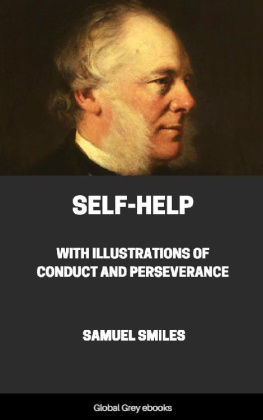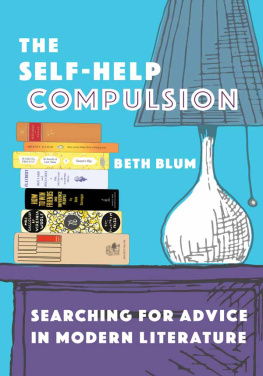SELF-HELP
WITH ILLUSTRATIONS OF
CONDUCT AND PERSEVERANCE
BY
SAMUEL SMILES
1859
Self-Help By Samuel Smiles.
This edition was created and published by Global Grey
GlobalGrey 2019

Get more free ebooks at
globalgreyebooks.com
Contents
Preface
This is a revised edition of a book which has already been received with considerable favour at home and abroad. It has been reprinted in various forms in America; translations have appeared in Dutch and French, and others are about to appear in German and Danish. The book has, doubtless, proved attractive to readers in different countries by reason of the variety of anecdotal illustrations of life and character which it contains, and the interest which all more or less feel in the labours, the trials, the struggles, and the achievements of others. No one can be better aware than the author, of its fragmentary character, arising from the manner in which it was for the most part originally composed,having been put together principally from jottings made during many years,intended as readings for young men, and without any view to publication. The appearance of this edition has furnished an opportunity for pruning the volume of some superfluous matter, and introducing various new illustrations, which will probably be found of general interest.
In one respect the title of the book, which it is now too late to alter, has proved unfortunate, as it has led some, who have judged it merely by the title, to suppose that it consists of a eulogy of selfishness: the very opposite of what it really is,or at least of what the author intended it to be. Although its chief object unquestionably is to stimulate youths to apply themselves diligently to right pursuits,sparing neither labour, pains, nor self-denial in prosecuting them,and to rely upon their own efforts in life, rather than depend upon the help or patronage of others, it will also be found, from the examples given of literary and scientific men, artists, inventors, educators, philanthropists, missionaries, and martyrs, that the duty of helping ones self in the highest sense involves the helping of ones neighbours.
It has also been objected to the book that too much notice is taken in it of men who have succeeded in life by helping themselves, and too little of the multitude of men who have failed. Why should not Failure, it has been asked, have its Plutarch as well as Success? There is, indeed, no reason why Failure should not have its Plutarch, except that a record of mere failure would probably be found excessively depressing as well as uninstructive reading. It is, however, shown in the following pages that Failure is the best discipline of the true worker, by stimulating him to renewed efforts, evoking his best powers, and carrying him onward in self-culture, self-control, and growth in knowledge and wisdom. Viewed in this light, Failure, conquered by Perseverance, is always full of interest and instruction, and this we have endeavoured to illustrate by many examples.
As for Failure per se, although it may be well to find consolations for it at the close of life, there is reason to doubt whether it is an object that ought to be set before youth at the beginning of it. Indeed, how not to do it is of all things the easiest learnt: it needs neither teaching, effort, self-denial, industry, patience, perseverance, nor judgment. Besides, readers do not care to know about the general who lost his battles, the engineer whose engines blew up, the architect who designed only deformities, the painter who never got beyond daubs, the schemer who did not invent his machine, the merchant who could not keep out of the Gazette. It is true, the best of men may fail, in the best of causes. But even these best of men did not try to fail, or regard their failure as meritorious; on the contrary, they tried to succeed, and looked upon failure as misfortune. Failure in any good cause is, however, honourable, whilst success in any bad cause is merely infamous. At the same time success in the good cause is unquestionably better than failure. But it is not the result in any case that is to be regarded so much as the aim and the effort, the patience, the courage, and the endeavour with which desirable and worthy objects are pursued;
Tis not in mortals to command success;
We will do moredeserve it.
The object of the book briefly is, to re-inculcate these old-fashioned but wholesome lessonswhich perhaps cannot be too often urged,that youth must work in order to enjoy,that nothing creditable can be accomplished without application and diligence,that the student must not be daunted by difficulties, but conquer them by patience and perseverance,and that, above all, he must seek elevation of character, without which capacity is worthless and worldly success is naught. If the author has not succeeded in illustrating these lessons, he can only say that he has failed in his object.
Among the new passages introduced in the present edition, may be mentioned the following:Illustrious Foreigners of humble origin (pp. 1012), French Generals and Marshals risen from the ranks (14), De Tocqueville and Mutual Help (24), William Lee, M.A., and the Stocking-loom (42), John Heathcoat, M.P., and the Bobbin-net machine (47), Jacquard and his Loom (55), Vaucanson (58), Joshua Heilmann and the Combing-machine (62), Bernard Palissy and his struggles (69), Bttgher, discoverer of Hard Porcelain (80), Count de Buffon as Student (104), Cuvier (128), Ambrose Par (134), Claud Lorraine (160), Jacques Callot (162), Benvenuto Cellini (164), Nicholas Poussin (168), Ary Scheffer (171), the Strutts of Belper (214), Francis Xavier (238), Napoleon as a man of business (276), Intrepidity of Deal Boatmen (400), besides numerous other passages which it is unnecessary to specify.
London, May, 1866.

Introduction To The First Edition
The origin of this book may be briefly told.
Some fifteen years since, the author was requested to deliver an address before the members of some evening classes, which had been formed in a northern town for mutual improvement, under the following circumstances:
Two or three young men of the humblest rank resolved to meet in the winter evenings, for the purpose of improving themselves by exchanging knowledge with each other. Their first meetings were held in the room of a cottage in which one of the members lived; and, as others shortly joined them, the place soon became inconveniently filled. When summer set in, they adjourned to the cottage garden outside; and the classes were then held in the open air, round a little boarded hut used as a garden-house, in which those who officiated as teachers set the sums, and gave forth the lessons of the evening. When the weather was fine, the youths might be seen, until a late hour, hanging round the door of the hut like a cluster of bees; but sometimes a sudden shower of rain would dash the sums from their slates, and disperse them for the evening unsatisfied.
Winter, with its cold nights, was drawing near, and what were they to do for shelter? Their numbers had by this time so increased, that no room of an ordinary cottage could accommodate them. Though they were for the most part young men earning comparatively small weekly wages, they resolved to incur the risk of hiring a room; and, on making inquiry, they found a large dingy apartment to let, which had been used as a temporary Cholera Hospital. No tenant could be found for the place, which was avoided as if the plague still clung to it. But the mutual improvement youths, nothing daunted, hired the cholera room at so much a week, lit it up, placed a few benches and a deal table in it, and began their winter classes. The place soon presented a busy and cheerful appearance in the evenings. The teaching may have been, as no doubt it was, of a very rude and imperfect sort; but it was done with a will. Those who knew a little taught those who knew lessimproving themselves while they improved the others; and, at all events, setting before them a good working example. Thus these youthsand there were also grown men amongst themproceeded to teach themselves and each other, reading and writing, arithmetic and geography; and even mathematics, chemistry, and some of the modern languages.
Next page










